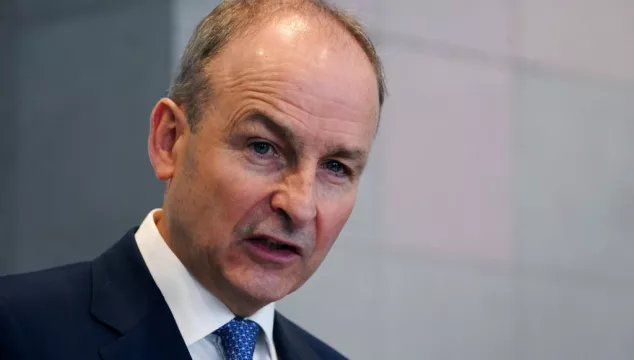Food security and growing energy prices having a knock-on impact on the costs of transport, industry and farming are among the "enormous issues facing us," the Taoiseach has warned.
Micheál Martin said the implications of the outbreak of war in Ukraine will be felt for some time, and will be “fundamental” to the continent of Europe.
He said there has been an “exponential growth” in energy prices in recent weeks, and that food security will be an issue across Europe.
“In teeth of the war, they are growing even further,” Mr Martin added.
“We have an open mind in what is the optimal route for Ireland to take to make sure industry continues, and the economy continues to operate.
“We are moving out of the worst of the winter but there are very serious issues in terms of input costs, in terms of the transport industry, farming and fertiliser and other costs.

“Food security will be an issue across Europe. These are enormous issues facing us.”
Mr Martin added: “The situation is very serious and I am of a view that the implications will be with us for some time, and they will be quite fundamental in terms of the continent of Europe and the world.
“First of all the humanitarian crisis resulting from this continuing barbaric attack on the people of Ukraine, which I think is shocking people all over the world, the sheer scale and nature of that barbarity.
“Right now, the focus is on logistical supports and financial supports to those at the borders that are to both countries like Poland, Hungary, and others who are looking after huge numbers of people.
“So we have to make sure that we can do everything we possibly can to support that effort.”
He said it is hard to estimate the number of people fleeing Ukraine who will arrive in Ireland.
We need immediate action from the Government to protect workers and families from the spiralling cost of living - @conwaywalsh
Many people have no access to public transport and have no choice but to pay the ever increasing proportions of their incomes on petrol & diesel. pic.twitter.com/PLYi5mckAH— Sinn Féin (@sinnfeinireland) March 3, 2022
“There is a sense now that this is going to be a longer situation than might have been originally viewed and therefore, areas around accommodation, economy, energy, the impact on energy will be significant,” Mr Martin added.
“This is a wartime situation and we’ve got to get our mindset focused on that.
“We have to look through everything through the prism that this is a wartime situation, which changes everything.
“We have to look at the energy issue. We have to look at the food issue in terms of the continent, and in terms of what does this do to food patterns now in terms of the capacity of Ukraine, and Russia jointly exporting massive amounts of grain and so on.”
Ministers meeting
Senior Government Ministers meeting on Thursday will discuss the impact of the Ukraine crisis on Ireland.
Tánaiste Leo Varadkar said Ministers will look at how Ireland can help the people of Ukraine, both in its political and humanitarian response.
“There will be a discussion on what else we may need to do or be able to do to help households and help businesses and farmers who are going to be affected by the sanctions and the economic disruption caused by the crisis in Ukraine,” Mr Varadkar added.
“Ireland doesn’t have a lot of direct trade with Ukraine or Belarus or Russia, but there will be indirect effects.”
He said the Government will give consideration to any further measures to help rising energy costs at home.
Speaking during leaders questions, Sinn Féin’s Rose Conway-Walsh said: “I believe that the way out of this, as with any conflict, is through politics and through dialogue.
“Undoubtedly, those severe sanctions are going to impact on ordinary citizens right across Europe and further afield.
“The price of oil and gas on international markets is on the rise once again and this follows massive price rises which are already putting huge pressure on households throughout this stage and contributing to the massive increase in the cost of living.
“People want something to be done, they need to feel it in their pockets. They need to feel it in their household incomes. They’re already struggling.
“I acknowledge some of the measures that have been done but some of them don’t kick in until September.”







